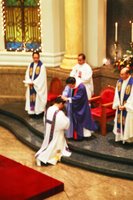
John 6, 5-56 Transformed in the Eucharist
A student once asked me about transubstantiation, when we encounter the mystery of Christ becoming truly present under the appearance of bread and wine. Even though the sacred species look exactly the same after the consecration as they did before the consecration, we know by faith that there’s a world of difference. Our Lord and Savior is truly present in our midst as our spiritual food, or as the Gospel tells us, as our bread of life.
But what does this do to us? Concretely, what about those of us who come to communion to receive the bread of life: do we look any different as we walk back to our pews than before received communion? After all, the Body and Blood of Christ are inside of us. Are we any different after we leave this church, about forty-five minutes later, outside of the church, than when we were inside? Why do we wonder why many of our leaders who have squandered money from our country suddenly appear on television receiving communion? How do we wonder ourselves that a few minutes ago we have not followed the traffic lights and find ourselves coming to communion? From the first Christians, who gathered for the ‘breaking of the bread’ (Acts 2, 46) to parishes today, which John Paul II called, “Eucharistic communities,” (Christifideles Laici, Dec 1988) the Eucharist has always been an integral part of Christian living. And yet, though we come to mass every Sunday --- and some daily even --- we ask the question, “Have I changed?”
We believe that through transubstantiation, bread and wine cease to be bread and wine but truly become the Body and Blood of Jesus, even though all physical properties, such as size, taste, appearance, and composition, remain the same. We cannot see the difference, but we accept this teaching through the vision of faith. But the sacraments effect an analogous change. A baby girl after baptism looks exactly the same as she did before, yet she is now a child of God and a member of the Church. Some believe that after baptism, she already can travel protected by God. A young man, after his ordination, looks the same as before the ordination, but can now consecrate the Eucharist and forgive sins in God’s name. After confessions, we look the same, but we have had our relationship with the Lord restored and renewed, and we feel light and happy. In all cases, we look the same on the outside, but at the core of our being we’ve radically changed. However, just as we benefit from food’s nutrients, only if we digest the food well, we benefit from the grace of the Eucharist only to the extent we effectively digest this spiritual food, this bread of life.
The MTV, I am about to present, tells us about leaders. It acknowledges that it is difficult to change, but as leaders, we must change because we are examples of service to others. Mahirap magbago, pero kailangan, dahil ehemplo. [This MTV is part of an anti-graft and corruption workshop given to many government offices and schools. The workshop called Ehem! has been adapted by the Office of the Ombudsman and given to various sectors in the government.]
We are all called to become leaders. Just as bread and wine transforms into the presence of Jesus, may we too transform into Christ-leaders. In UP, we know that many of you are subsidized by the people of the country so that you will become not just effective leaders but heroic leaders for the country. Your leadership positions, whether as student leaders, civic, church & government position, are not trophies to be proud of. Respect is earned. Offer your services well at walang daya. Take the opportunities to serve others.

No comments:
Post a Comment